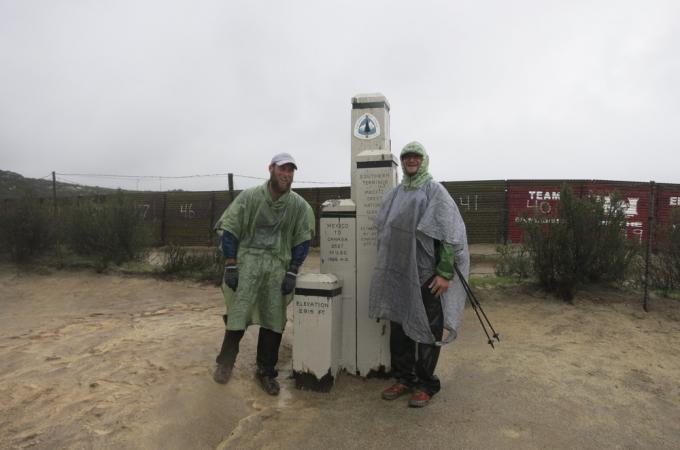Two Men Become First Ever To Finish Pacific Crest Trail In The Winter Time
The record has been broken, two men with Truckee connections whom go by the trail names Trauma and Pepper, have officially become the first ever individuals to complete grueling 2,650 mile Pacific Crest Trail in the winter time. This article was written by Tim Hauserman with Moonshine Ink.
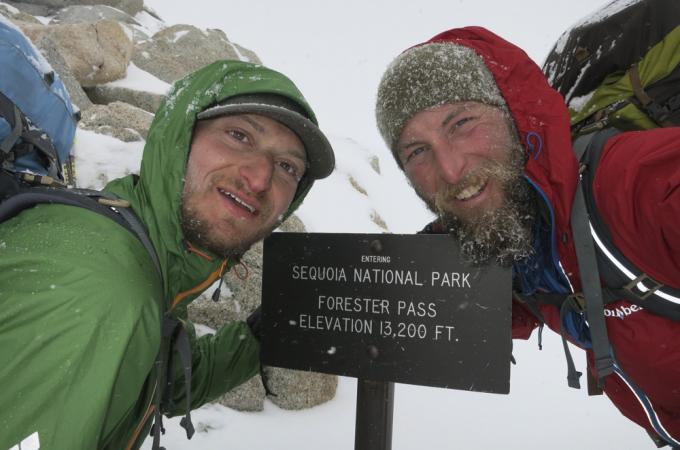
The Pacific Crest Trail winds its way 2,650 miles from Canada to Mexico, passing over lengthy mountain ranges and across enormous deserts. Just a few hundred people have the stamina to complete the trek each year, pushing hard to finish before the winter snows make it seemingly impassable. Last October, two guys with Truckee connections, Justin Lichter (trail name Trauma) and Shawn Forry (trail name Pepper), decided to try something different: They began their PCT hike on the U.S./Canada border on October 21, 2014 and completed it on March 1, 2015, becoming the first people ever to complete the entire PCT in the winter.
Justin Lichter lives in Truckee and is a member of the ski patrol at Boreal and Sugar Bowl ski patrols. He is the author of Ultralight Survival Kit and Trail Tested: A thru-hikers guide to ultralight hiking and backpacking, both published by Falcon Books. Shawn Forry lived in Truckee between 2010 and 2014, and now lives near Yosemite. He works for Outward Bound.
Tough Times on the Trail
Trauma and Pepper fought frostbite, winter temperatures, storms, weeks of slurpee-like snow, and thousands of miles without seeing another soul, and still ended up completing the trail a month sooner than planned. Out of 2,650 miles, they skied 450 miles, snowshoed for over 600 miles, and hiked the rest on their way to Mexico.
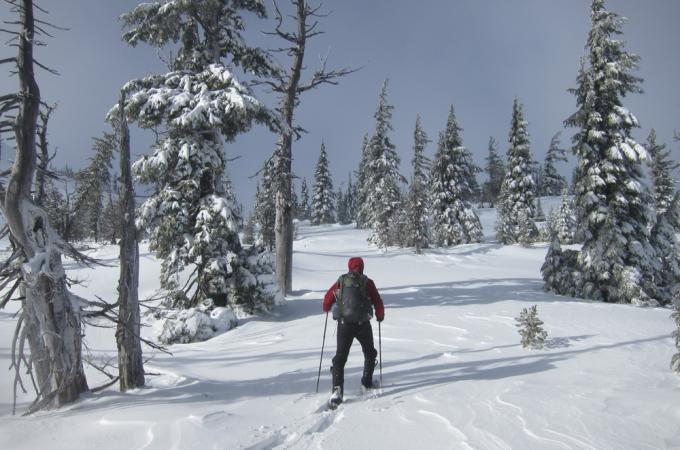
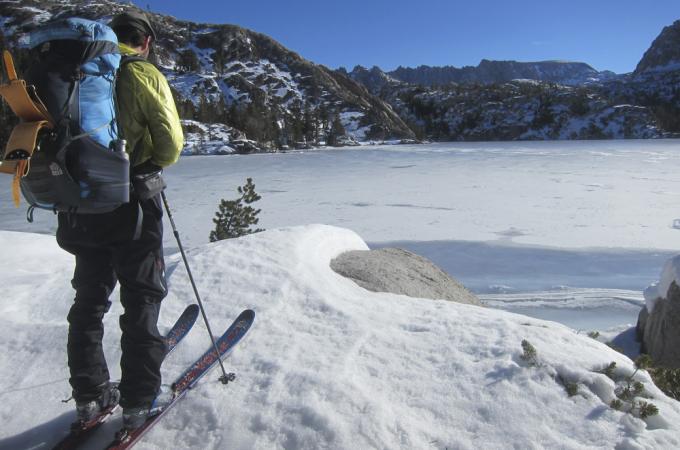
“The first two months were the hardest,” Trauma said, reporting that it rained or snowed almost every day during this time. Pepper got frostbite on the side of his foot, and Trauma suffered frostbitten toes. “We sat down in northern Oregon and had the conversation that this could be the end. Instead we began monitoring the frostbite daily. Our feet function fine now, but it will take awhile to get full sensation back,” Pepper said. “It takes a long time for frostbite to heal.”
Trauma and Pepper have hiked over 7,000 miles together in some of the most challenging terrain in the world, including border to border across the Nepalese Himalaya, the Araroa Trail in New Zealand, and the Hayduke Trail in Southern Utah. This trip was “something we had thought about for over five years. It was the next logical progression after all the other hikes we had done,” Trauma said.
Before they began their trek they did some tune-up trips, around Tahoe and in the High Sierra, to test gear for long-distance hiking and skiing in the winter. Since their trek was a first, no one really knew what to bring. They discovered that lightweight backcountry ski gear doesn’t work so well when skiing day after day in boots that don’t dry overnight. They also discovered that no matter what you wear on your feet, it takes a toll.
While they expected the PCT to be a lonely place in the winter, it was even lonelier than they imagined. They did not see another person on the trail between Snoqualmie Pass in central Washington and Walker Pass in the desert of Southern California, a stretch of more than 1,700 miles and almost 100 days. In these conditions, a dependable hiking partner is paramount for support. Fortunately, with all the miles they previously hiked together they understood each other’s personalities. “We know each other pretty well. We know how we work together and react when things get tough. And we know when to leave each other alone,” Pepper said.
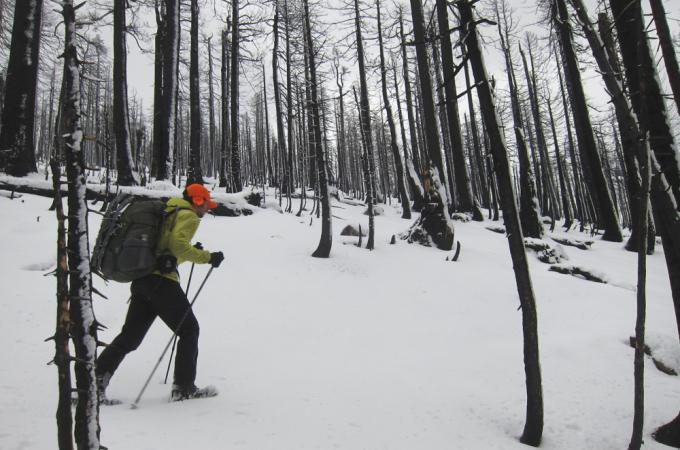
Consequences of the Fickle Winter
While Trauma and Pepper lucked out with the exceptionally mild winter, in some sections it actually made the trek more difficult, especially since it meant they would be skiing fewer miles. Often, they would skin up the north facing side of a pass, and then have to walk on dirt or ski in treacherous conditions on the south facing side.
They also faced enormous route-finding challenges (they used a map and compass instead of GPS). The toughest part was “just knowing that we were hiking in the middle of the winter. We always had a cloud hanging over our head about facing the unknown,” Pepper said. It was all about “trying to stay ahead of weather to figure out where we would be safe if it storms,” Trauma said. Hiking through steep terrain at 11,000 feet in a major blizzard can be treacherous and life threatening, and with 1,700 miles of hiking alone, they could not depend upon the kindness of a stranger coming upon them to help out. “It was surreal to be out there by yourself. We were wondering why we didn’t see more people,” Pepper said.
Some sections proved better for hiking in the winter than the summer. While the desert regions of California can be hot and dry torture in the summer, they were cooler and loaded with wildflowers when Trauma and Pepper passed through. Another advantage of hiking the trail in the winter was that the route is more direct. While in the summer you hike the long switchbacks up and down the passes, in winter you can straighten out the lines and ski down the backside.
May is a common month for northbound thru-hikers to start the standard summer PCT crossing. Knowing that, the duo were also quick to warn against the uninitiated taking on such a challenge, lest the inexperienced get overly inspired. “It is definitely something you would want to build up to,” Trauma said. Aside from the danger of getting caught in a major storm, avalanche danger can be an extreme threat. Only those with a great deal of avalanche training and the patience to wait it out if necessary, should consider the challenge. It also takes extensive winter backpacking experience, and the mental fortitude to deal with the extreme temperatures and going long distances without seeing other hikers. Finally, it takes a bit of luck that the timing of the journey will not coincide with a major blizzard at a 13,000-foot pass.
“There were people giving us hot meals and a warm place to stay when we got off the trail,” Trauma said. The duo went off the trail about 20 times during the trip. Ultimately, it was the support of the trail community that helped them face the emotional challenges of the trip. And perhaps even better, the chance to hear another human’s voice.
